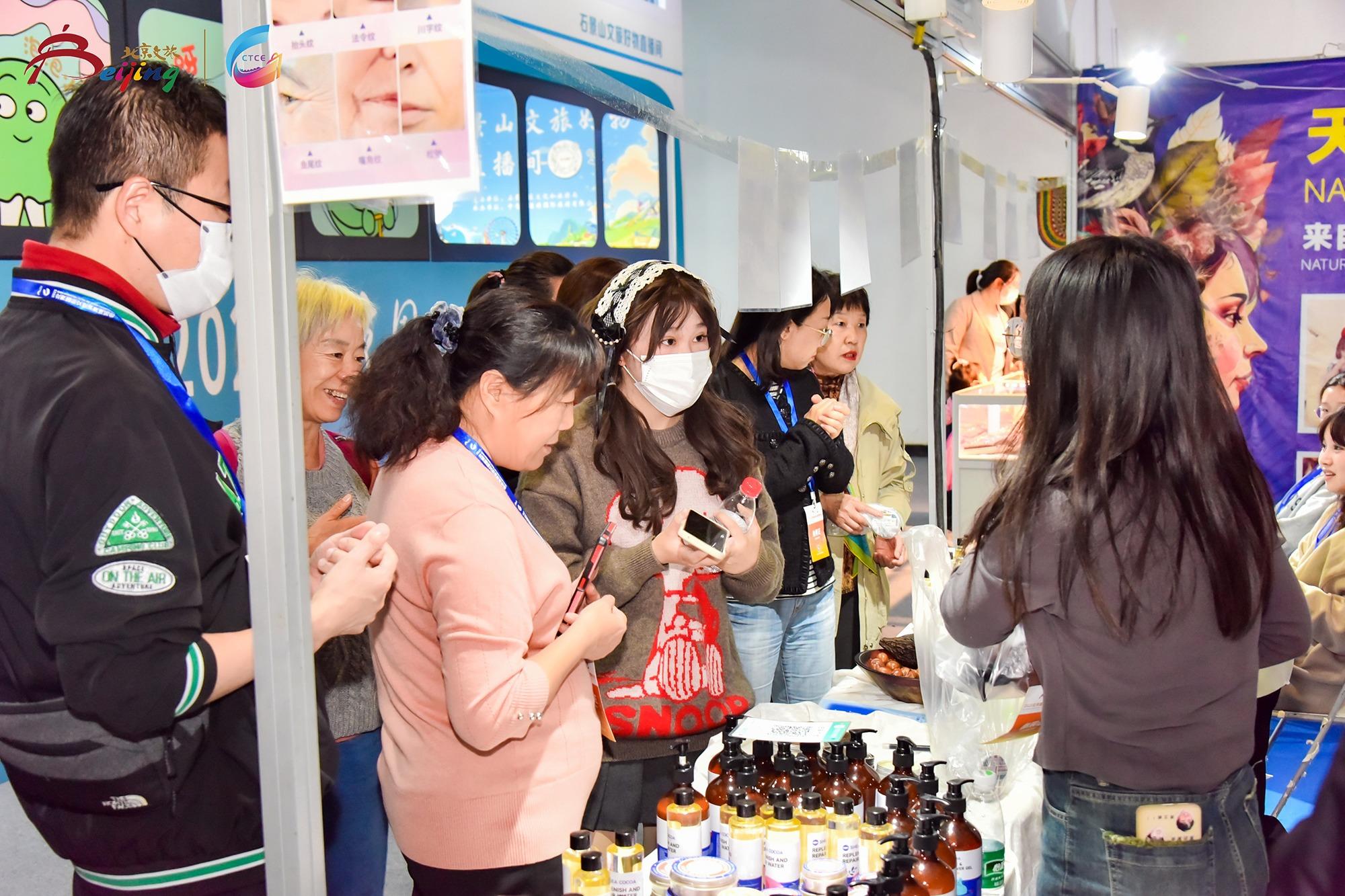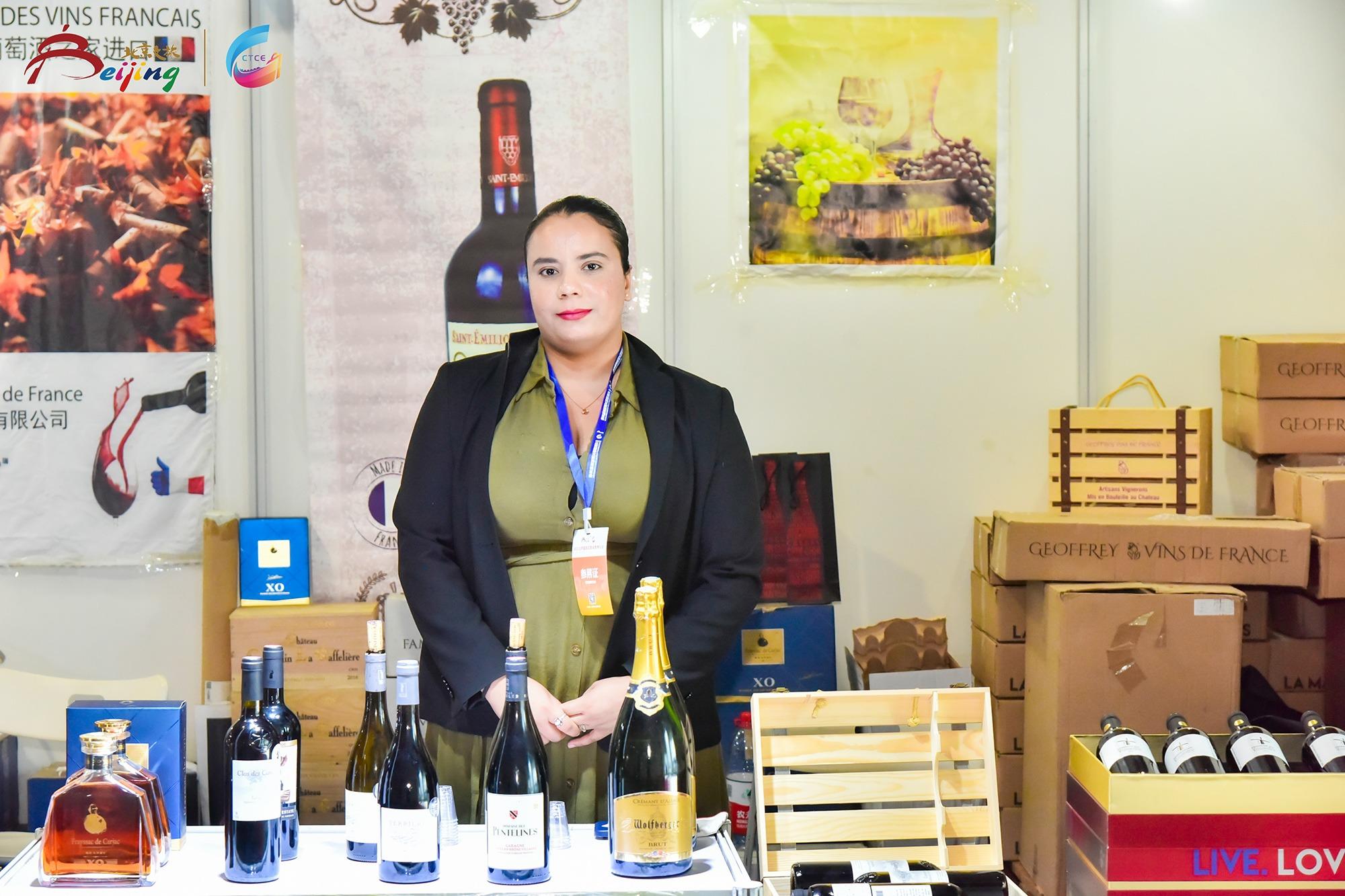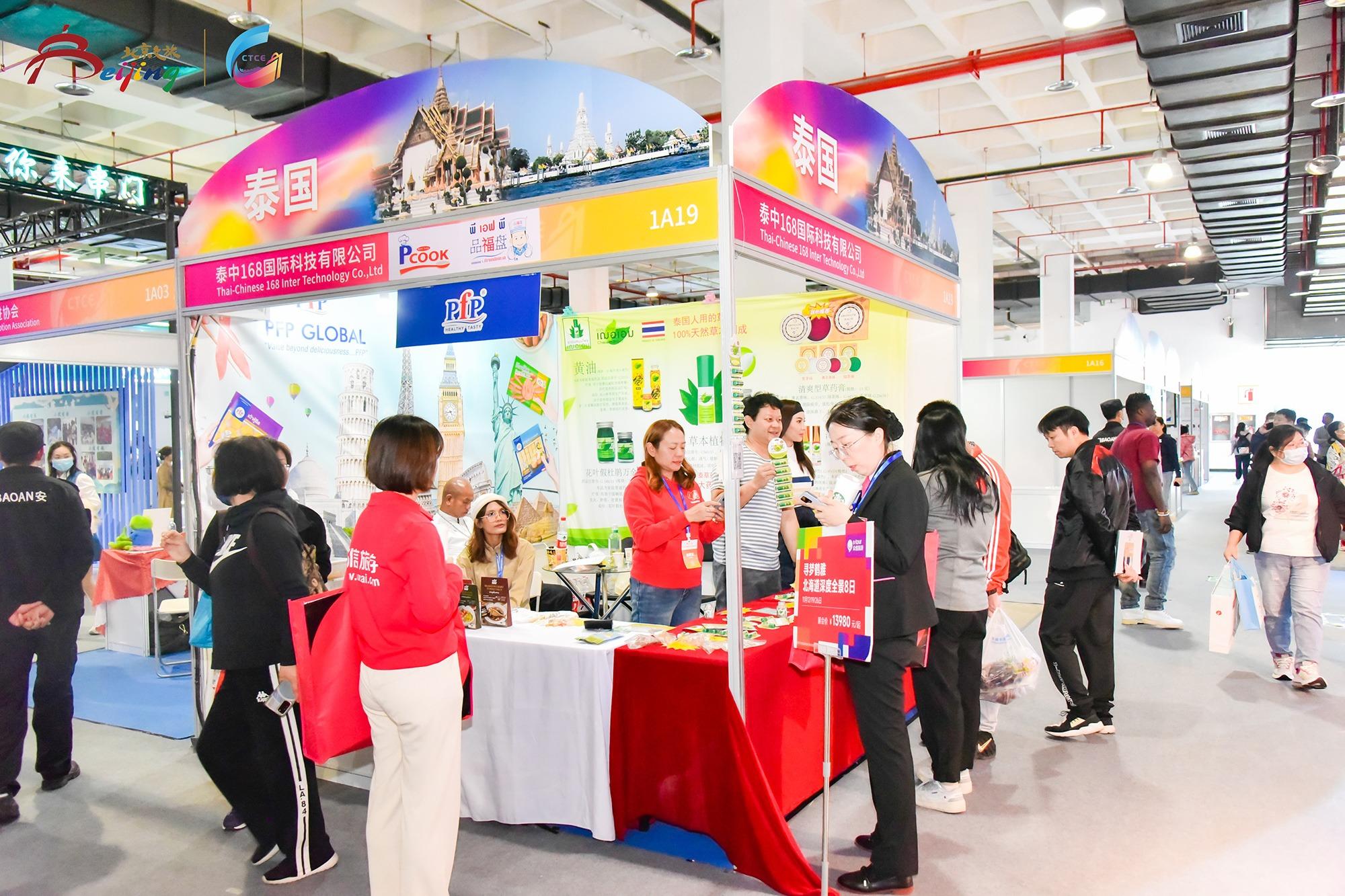This year's Beijing International Cultural and Tourism Consumption Expo didn't disappoint, Yang Feiyue reports.
 Visitors inquire about food and skin-care products from the Republic of Mali at the recently held Beijing International Cultural and Tourism Consumption Expo, where representatives from 350 companies and organizations promote cultural specialities and tours. (PHOTO PROVIDED TO CHINA DAILY)
Visitors inquire about food and skin-care products from the Republic of Mali at the recently held Beijing International Cultural and Tourism Consumption Expo, where representatives from 350 companies and organizations promote cultural specialities and tours. (PHOTO PROVIDED TO CHINA DAILY)
Jack Boama from Ghana was surrounded by eager Chinese consumers clamoring to buy the distinctive products he brought from his homeland to a recent cultural and tourism consumption expo in Beijing.
"They showed great interest in our products and purchased a lot of them," says Boama, who has been promoting Ghanaian specialities in China for more than five years.
Chinese consumers recognize high-end products, and appreciate their value. Many of our customers have traveled the world, and they understand different cultures.
Yang Han, sales manager of a company trading handmade products from Pakistan
The cocoa bean and avocado butters, black soaps, and handmade artworks — ranging from straw and leather bags to ceramics and drums — piqued the interest of many customers during the Beijing International Cultural and Tourism Consumption Expo, which opened on Oct 20.
"They are all made from natural elements typical of our country's resources, and can all be used in daily life," Boama says.
Boama attributes the increasing popularity of his country's products to modern Chinese customers' preference for natural goods and a simple lifestyle.
"Their travels have also given them a taste for exotic artworks," Boama says, adding that Chinese travelers who buy from him often hang African art at home for decoration or keep it as collectibles.
He has taken part in many promotional events around China over the years, at places including Shanghai, Changsha, provincial capital of Hunan province, and Hefei, the capital city of Anhui province.
"The Chinese market is good," Boama says, adding that the Belt and Road Initiative has played a positive role in facilitating the trade of souvenirs and goods between China and Ghana.
Boama was among representatives from 350 companies and organizations involved in selling cultural products and tourist experiences that were present at the Beijing expo.
They ranged from companies involved in selling products and tourist services, to ones offering travel equipment and AI and robotic solutions for travel. The event was hosted by the Beijing Municipal Bureau of Culture and Tourism.
Some 20 provinces and autonomous regions from around the country, as well as 18 overseas exhibitors, including France, Sri Lanka, Serbia and Thailand, showcased what they have to offer at the expo.
 A counter with wine from France. (PHOTO PROVIDED TO CHINA DAILY)
A counter with wine from France. (PHOTO PROVIDED TO CHINA DAILY)
Exquisite handmade scarves, rugs and ethnic costumes exuded a strong South Asian vibe at the Pakistan booth.
"Chinese consumers recognize high-end products, and appreciate their value," says Yang Han, sales manager of a Zhejiang-based company mainly specializing in the trade of handmade products from Pakistan.
"They are drawn to delicate handicrafts, such as silk embroidery, as well as the fact that every single piece is one of a kind," Yang says, adding that most of his customers have given him positive feedback, especially for Pakistani rugs.
Yang's company has seen consistent growth in the sale of Pakistani goods in China over the past decade, which he attributes to both the sophisticated taste of Chinese consumers and the good relations between the two countries.
"Many of our customers have traveled the world, and they understand different cultures," Yang says.
Moreover, the Chinese government has given vigorous support to Yang's business, such as favorable customs and tax policies, which he says has facilitated the import of the handicrafts his company sells.
"This, in turn, helps ensure the craftsmen in Pakistan live a quality life," Yang says.
At the Serbian booth, coffees, chocolates and crystals were on display, attracting a continuous flow of visitors.
"A considerable number of Chinese consumers have warmed up to the country's products, especially brand-name coffees," says Zhang Wenjie, who helped receive visitors to the booth on behalf of the Serbian national industry and commerce federation.
General sales of Serbian-brand coffee in China have been trending upward over the past eight years, Zhang says.
Even during the past three years, in the grip of the COVID-19 pandemic, sales continued growing slowly but steadily — at between 3 and 5 percent annually — he adds.
Participation in the expo is part of Serbian efforts to expand the presence of its products in the Chinese market, Zhang notes.
China offers a favorable duty-free policy on many Serbian products.
"It has been a great incentive for us, as it helps cut costs, and we have been seeing more enthusiasm in trade," Zhang says.
 A counter sells herbal products from Thailand. (PHOTO PROVIDED TO CHINA DAILY)
A counter sells herbal products from Thailand. (PHOTO PROVIDED TO CHINA DAILY)
At the Thailand counter, a Thai salesperson called Sarah was answering questions from enthusiastic Chinese visitors.
"We brought 10 products from Thailand this time," says Sarah, who speaks fluent Chinese.
As one of the most popular outbound destination for Chinese tourists, Thailand has many products, especially herbal products for skin problems, which are very popular among Chinese travelers.
This prompted Sarah and her team to bring Thai products closer to consumers here.
"We'd like them to be able to get our products on their doorstep, without having to travel far," Sarah says.
She says that Thai herbal products have enjoyed brisk sales during her participation in multiple promotional events this year, including those in Shandong and Sichuan provinces and the Guangxi Zhuang autonomous region.
"We'll certainly participate in more events like the Beijing expo, if more opportunities present themselves," she says.
Nalika Kodikara, minister-counselor of commercial affairs with the Embassy of Sri Lanka in China, also attended the Beijing expo to highlight what her country can offer as a tourist destination.
"This is a good time for Chinese tourists to visit Sri Lanka, as we have a preferential policy to welcome Chinese tourists," Kodikara says.
Visa-free entry for Chinese travelers has been approved by the Sri Lankan government and has been in effect since last month, she adds.
Chinese travelers have shown enthusiasm for the wildlife, landscapes, history and heritage of Sri Lanka.
"They love to visit our spice gardens and tea plantations," Kodikara says.
"Since March, we have seen a tremendous increase in the number of Chinese tourists visiting Sri Lanka," she adds.
Now there are five direct flights from Beijing, Shanghai, Chengdu in Sichuan province, Guangzhou in Guangdong province and Kunming in Yunnan province. The Chinese account for the third-largest group of international tourists to Sri Lanka so far this year, Kodikara says.
During the recent third Belt and Road Forum for International Cooperation in China, the two sides spoke positively of the progress of bilateral cooperation on culture and tourism.
In a joint statement from the forum, the two sides said they will continue to encourage their citizens to travel to each other's countries and provide assistance for each other to expand tourism. Both sides agreed to encourage better air connectivity. Sri Lanka is ready to introduce more policies to facilitate tourism, while China is ready to provide facilities to build a Sri Lankan Buddhist pagoda at the Baima Temple in Luoyang, Henan province.
With government support on both sides, Kodikara is confident that more Chinese travelers will visit Sri Lanka and play a bigger role in promoting tourism and its economy.
Contact the writer at yangfeiyue@chinadaily.com.cn


